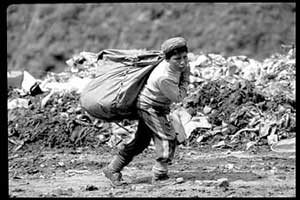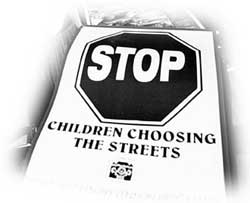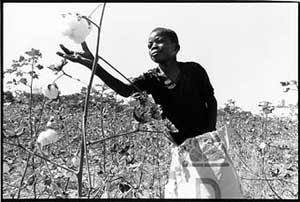The importance of this convention for child workers of Peru
For us child and adolescent workers, the convention, like the universal declaration, as an internatio-nal judicial instrument, defending the rights of all children, boys and girls, is a very big step forward, and very important for us, because it is universal and because it takes account of all children, as legal subjects, without discrimination regarding race, sex, language or religious or political beliefs.
It considers the child or adolescent as a social entity, that is to say, in the same way as any person who contributes in one way or another to the development of our society; consequently we are considered and seen as subjects and not objects, as persons, and our right is recognised, to participate, to express an opinion, to organise ourselves, and to enjoy protection as children, from all forms of exploitation in the field of work (convention art. 32.)
In several of the articles of the convention, mention is made of the superior interest of the child, which means for us that all our needs and interests belong to the whole population and consequently they are not something isolated from it or outside it.
The Convention seen from our own experience and perspectives as child workers
From our own experience of life, we child and adolescent workers have reviewed and analysed the CONVENTION and see that the articles are important and very well set out, but unhappily it is difficult for some persons truly to put them into practice.
In our adult-centred society, where maturity is considered to be synonymous with adulthood and the capacity of children and adolescents to contribute is still not recognised, we are prevented from participating, giving our opinion and taking decisions on those issues which concern us (convention art.12), at both national and international level. For example:
- To participate as a child and adolescent organisation (convention art. 15) with our own originality in meetings with the authorities of our countries and to see that they remain incredulous with regard to what we say and what we propose, and persons who represent international institutions who not only doubt what we say, but even dare to injure us with negative adjectives and even at times insult us.
- We had decided to participate with a delegation from our Latin-American and Caribbean movement at the international conferences to be held in Amsterdam, Holland 1997, Oslo, Norway 1997 and Geneva in 1998, which were planned by the governments of the countries concerned and organising bodies, whom we also asked if we could attend with equal numbers of participants (20 ministers, 20 of our representatives decision from Kundapur - India, 1996 and Lima - Peru 1997), the child and adolescent worker participants being representatives from the organisations and movements in our region. We established principles and elected our delegates to represent us as these mentioned conferences, and in Oslo what happened was that they closed the places, preven-ted us from presenting our own message and ill-trea-ted us, ejecting us from the meeting place. This has remained fixed in the memories of the child workers form Latin America and the Caribbean; as have the threats which were made that they would take away our funding if we continued to organise according to our own autonomous criteria and our message based on our lives for all children.
All this brought us problems but also moments of deep and serious reflection and we have not taken down our guard, but we feel ourselves stronger than before despite the threats. We propose to evaluate this whole process in greater depth, with the New Convention document in our hands, in our National Meetings, and also at the regional level Latin American meetings, which are planned to take place during the first half of next year, as a sign of hope for a new millennium from the child and adolescent workers' point of view.
The authorities who worked out and drew up the International Convention on the Rights of the Child, have done well, but as boy and girl child workers we can see in practice that they are still a long way from our own reality, because on many occasions not only do they contradict and misunderstand, but even have doubts about us, what we say and what we think and feel, accusing us of being manipulated by the people accompanying us and provide us with orientation, facilitating our actions, and this is hurtful for us, because they make us feel badly and above all we feel it as an insult when they doubt our word and our proposals.
Suggestions for the future
As child and adolescent workers, we would like to be recognised in the convention as social protagonists in order to be able to carry out our social role.
Finally we know that there is still a long battle ahead of us to ensure that the churches, governments and society in general will respect "child rights" and, above all, for them to listen to us and recognise that through our organisation we are working for human dignity.
We have the hope and are working to ensure that one day we may be able to exercise our social role side by side with young people, mothers, farmers, workers, old persons, etc., and so be able to share proposals which will make of our planet a place, or a space, where we can all express ourselves respectfully, gently and confidently regarding what we are doing as human beings to live our lives with dignity.
Geneva, 12 April, 2000
Patricia Cruzado Muñoz is 18 years old and is a member not only of the Global Ecumenical Children's Network but also a Delegate of the Movement of Child Workers of Peru. Patricia began her social solidarity activities at the age of 7. She began working at the age of 7 to help improve her family's economic situation and to be able to pay the cost of her school studies. Presently Patricia is working as a gardener and is studying computer systems in the evenings. In January 2000 she participated in a WCC capacity-building programme.
The Convention on the Rights of the Child
The Convention on the Rights of the Child (CRC) can be well implemented in developing and underdeveloped countries. The CRC, the most widely signed human rights convention in the world, has been in place for ten years yet we are still witness to obvious violations of the convention world-wide. It is seemingly a matter of the United Nations and UNICEF's having to lead the way as watchdogs for children.
It is very difficult to raise the standard of living for children without bringing up the standard of living for the entire population. Similarly, it is proving difficult to eradicate child labour without reshuffling the economy or causing an upheaval of the workforce.
Many of the articles in the CRC deal with issues pertaining only to children, while others are problems shared equally by adults. Many possible reforms in developing and underdeveloped countries, such as improved health programmes, would improve the quality of life for adults and, even more so, children, due to the high percentage of infant mortality.
Basically, improvements in three fields could halt the cycles of poverty and hunger. Education, health, and the economy, if improved, could drastically change a country. In developing and underdeveloped countries three major problems hinder development: education, economy, and health including nutrition are, in some cases, at primitive levels. Each one of these problems has identifiable causes.
To start with, large-scale education problems are due either to a lack of schools, the high costs of attending them, or of children's having to work for a living.
Health problems can be attributed to climate, lack of proper nutrition and primary care infrastructure, problems with distribution of drugs and, in most cases, lack of access to potable water. Malaria is a good example of how climate causes health problems because the cure for malaria used in temperate zones can not be used effectively in equatorial zones. This means that pharmaceutical companies in industrialised countries have decided that it is not good business to develop a cure for equatorial malaria because of the low profit margin. Lack of good nutrition and/or clean water can place people in a weakened state that leaves them susceptible to diseases they normally could resist. Children are at an even greater risk.
Finally, the weakness and instability of developing and underdeveloped countries can be associated with their exports. Most underdeveloped countries export commodities that are unnecessary to them and import needed commodities, such as food. In this system, they are not self-sufficient and can be drastically affected by changes in commodity prices. In other words, an industrialised country (or a multinational corporation) uses a developing or underdeveloped country to supply itself. This is one of the reasons that the economies of developing and underdeveloped countries are stalling now; it is also why (especially in Africa) they became this way. Mercantilism, exemplified by a colony supplying the "motherland", has ruined many economies and crippled many countries.
Plans of action and strategies for change
To protect children's rights on a large-scale basis, we must ensure both proper infrastructure and suitable living conditions. Living standards must improve if children's lives are to improve.
It is very hard to address children's rights of in a country where there is war or where the population is desperate for its next meal. It is possible to address children's rights in industrialised countries because the proper infrastructure is already in place. Essentially, we must raise the standard of living in developing and underdeveloped countries in order to provide a chance of cementing children's rights.
An effective solution would be to pair up industrialised countries with underdeveloped and developing countries in order to improve the situations in the latter. Countries could be paired based on their complementary strengths and weaknesses. States leading the world in agricultural techniques would help those with famine. Nations that are plentiful in water would help those with contaminated water. Industrialised countries could share their experiences and take roles in the development of a poorer nation's economy. Those nations on the leading edge in the pharmaceutical world could be commissioned to develop vaccines and cures for diseases of the equatorial climate. For example, Russia, which is ranked fourth in the world in wheat production, could be paired up with Swaziland, which ranks 118th out of 120 countries analysed. Another pair could be Switzerland, which ranks first in the world in its ratio of hospital beds to people, and Nepal which ranks last of countries analysed.
Essentially, industrialised states could take a true interest in developing these countries one by one, region by region. It is their spirit of cooperation in the true sense of the word that will help develop these countries.
It is in the world's best interest to have a better developed planet, and a great way to accomplish that is to have industrialised nations helping, and not hindering, developing or underdeveloped nations. This type of plan would provide cures for diseases, increase food availability, improve the economy, and provide higher standards of education. This plan would also raise part of the world out of poverty and facilitate the implementation of children's rights and the Convention on the Rights of the Child.
This "pairing" theory of the implementation of the CRC can be taken one step further. On a grass-roots level, the plan will succeed only if there is strong support from both community and religious groups. These institutions must help to facilitate the change in developing and underdeveloped countries.
The support of world-wide religious organisations, such as the World Council of Churches, is crucial to ensuring that these reforms are carried out. The many international non-governmental organisations with offices, hostels, or shelters in underdeveloped or developing countries could help by providing services for locals. These organisations could provide medical care, educational services and nutrition. This type of action is already taking place; however, it is in dire need of financing. The pairing system could supply funding and advice to local organisations which directly affect the lives of many in a positive way.
Children's rights can only truly be implemented on a large scale in developing and underdeveloped countries if the conditions for change are ripe. Industrialised nations need to help out other nations by working with them to solve individual and regional problems. Once we improve the living conditions and have the proper infrastructure in place, it will be relatively easy (compared to the current situation) to reform children's rights. This must be considered as a global project, calling on the efforts of the UN and many of its divisions. Countries must take pride in what they are doing and realise that the benefits are mutual and that, in the end, we all reap them. It is a project that can be realised, and one whose results would certainly change the world in a truly beneficial way for all.
Works cited and consulted:
Arnold Engels is 14 years old from Canada. He became involved in activities in solidarity with marginalised children when he was just 11 years old. Arnold attended several children leadership / human rights training sessions during weekends. He has already given several speeches to labour organisations at national and international meetings. His first participation in the WCC-Global Ecumenical Children's Network activities was in support to the Global March in 1997, in Geneva, when he came as part of the Free the Children Delegation.





